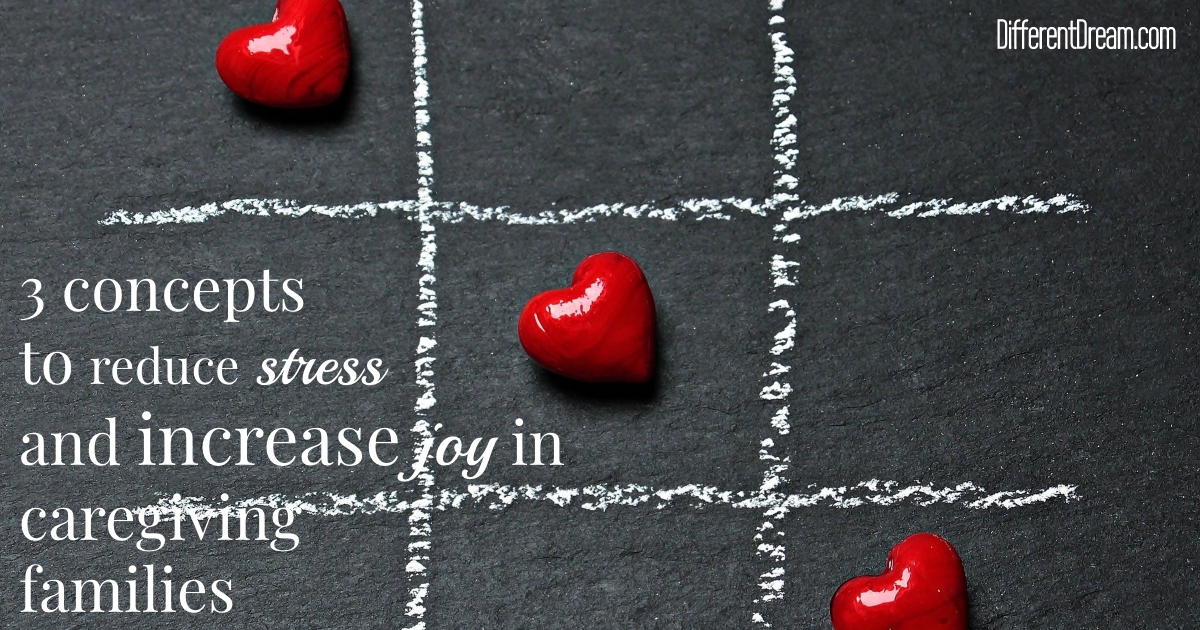Basic Love Language Concepts to Ease Stress and Increase Joy in Caregiving Families

Basic love language concepts are tools caregiving families can use to ease stress and increase joy. And who doesn’t want that? Here are three basic love language concepts that can help you get less of the first and more of the second.
Basic Concept #1
Dr. Gary Chapman, with whom I co-authored Sharing Love Abundantly: The 5 Love Languages® for Parents Raising Children with Disabilities, developed his love language theory in the 1990s. He believes that humans express love in five different ways.
- Words of Affirmation: This language uses words, spoken or written, to affirm and encourage people.
- Quality Time: A person with this love language want your undivided attention and time.
- Receiving Gifts: Individuals with this love language feel most loved when they receive gifts.
- Acts of Service: People who appreciate actions more than words gravitate to this love language.
- Physical Touch: For these people, nothing speaks love more deeply than appropriate touch.
Basic Concept #2
The second basic love language concept consists of 3 simple statements.
- Everyone has a primary love language, and many people have a secondary one.
- We feel most loved when others use our love language.
- To make others feel loved, we have to know their language and learn to use it.
So how can you discover your primary language and the languages of others? By taking the short and easy love language quiz. They are included at the end of the first chapter of Sharing Love Abundantly and in online versions at the 5 Love Languages website.
Basic Concept #3
The final concept to explore is the love tank. We are all born with a love tank that requires filling for our emotional to develop and mature. Heavy doses of love spoken in our primary and secondary languages can keep our love tanks full. When our tanks are full, we’re better able to use the love languages of other people and fill their tanks.
These basic love language concepts are discussed in greater detail in the first chapter of Sharing Love Abundantly. Other chapters in the book explain strategies for determining the love languages of kids who who have conditions that make the quizzes hard to use with them. So hang tight! I’ll be blogging about those strategies as this series continues. Or you can purchase the book at your favorite bookstore or on Amazon if you want to learn about them right away.
Other posts in this series:
The Love Languages and Special Needs Families: A Good Combination
Threats to Caregiving Marriages and How to Fight Them
Fostering Communication and Connection Between Caregiving Parents
Love Is a Child’s First Language
Determining the Love Language of a Child with Special Needs or a Disability
Ways to Speak Words of Affirmation and Quality Time to Kids with Special Needs
Speaking Healthy Physical Touch to Kids with Special Needs
Using the Love Languages with Siblings of Kids with Special Needs and Disabilities
Extended Family Members Can Use the Love Languages to Encourage Caregiving Parents
Communicating Your Child’s Love Language to Medical Professionals
Do you like what you see at DifferentDream.com? You can receive more great content by subscribing to the monthly Different Dream newsletter and signing up for the daily RSS feed delivered to your email.
By Jolene
Jolene Philo is the author of the Different Dream series for parents of kids with special needs. She speaks at parenting and special needs conferences around the country. She’s also the creator and host of the Different Dream website. Sharing Love Abundantly With Special Needs Families: The 5 Love Languages® for Parents Raising Children with Disabilities, which she co-authored with Dr. Gary Chapman, was released in August of 2019 and is available at local bookstores, their bookstore website, and at Amazon.
Related Posts
We Are FOR Parents and Children
Guest blogger Heather Braucher explains how as special needs parents, we are FOR parents and children just like God is FOR us.
The Power of an Open Window
In caring for her mother with dementia, Jolene finds that the power of an open window makes a huge difference.
Mindset Does Matter on This Special Needs Journey
Guest blogger Sandy Ramsey-Trayvick explains that mindset does matter in living a life of joy as a special needs parent.






0 Comments